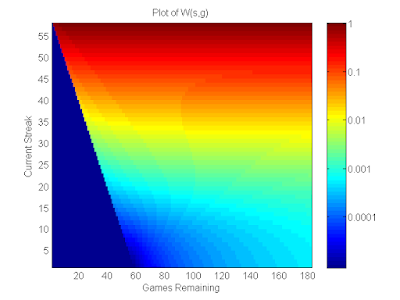Evaluating the Sum of a Geometric Sequence
This is a short blog post that shows you an easy and intuitive way to derive the formula for
the summation of an infinite geometric sequence. Let \( 0 \leq p < 1 \), and let \( a \) be some constant;
then we wish to find the value of \( x \) such that
$$ x = \sum_{k=0}^\infty a p^k $$
Writing out the first few terms of the summation, we get:
$$ x = a + a p + a p^2 + a p^3 + \dots $$
Rewriting the equation by factoring out a \( p \) from every term except the first,
we get:
$$ x = a + p (a + a p + a p^2 + \dots) $$
Notice that the expression in parenthesis is exactly how \( x \) is defined. Replacing
the expression with \( x \) leaves us with:
$$ x = a + p x $$
Solving the equation for \( x \) yields
$$ x = \frac{a}{1-p} $$
Just remember this simple derivation and you will never have to look up the formula
for evaluating the sum of an infinite geometric sequence ever again!

Comments
Post a Comment